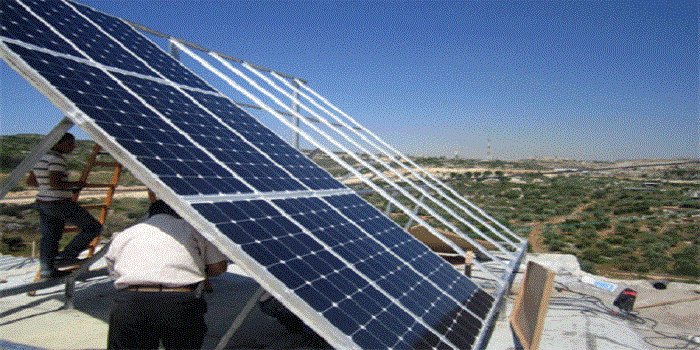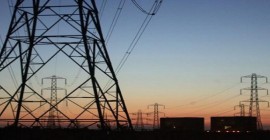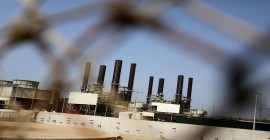High Cost of Alternative Energy Sources Hinders their Availability for Houses

Mutasim Muhsen – Palestine Economy Portal
Translated by Tamara Barakat
Palestinians have succeeded to some degree in taking advantage of solar energy since the seventies of the last century. They only use solar energy to heat water through solar panels that can be found at almost all Palestinian homes. However, they have not been able to employ solar energy for electricity generation for several reasons, despite the fact that the international interest in solar energy increased after the petroleum crisis in the seventies, and some countries, especially industrial ones, have achieved great progress in this field.
The idea of buying solar energy services did not meet the approval of Ali Musa, a citizen from the village Kharbatha al-Misbah, for he prefers to pay 100 to 150 shekels in electricity bills each month instead of purchasing the costly alternative energy sources.
On the other hand, Murad al-Ahmad, a citizen from Jenin, expressed his desire to have alternative energy sources available for each house. He believes that the high cost of such energy sources stand in the way of achieving that, especially since the benefits of these sources become apparent in the long run.
Shahinaz Barghouthi, a citizen from Ramallah, called on the specialized parties to reduce the obstacles preventing the provision of these services to the citizens, especially since “the cost of living, including the bills they have to pay, plague their minds.”
Reasons behind High Costs of Alternative Energy Sources
Using solar energy instead of relying on non-renewable energy sources is not very far from reach. However, installing solar energy systems requires high expenses and its benefits are not immediately reaped, but rather become apparent in the long run.
The head of the Alternative Energy Department at the Brothers Engineering Group, Dr. Mohammad Salem, attributed the high cost of installing such systems to the high cost of the equipment demanded by their producer. The import costs and the customs duty imposed on the equipment increase their price, and the increase in the value of the dollar against the local currency also increases the import costs. Consequently, the demand on solar energy systems becomes weak.
The head of the Palestinian Energy and Environment Research Center at the Palestinian Energy and Natural Resources Authority, Eng. Ayman Ismail, believes that the cost of alternative energy services should not drive the citizens away from purchasing them since such services will benefit them eventually.
Ismail hails the tax exemption on these services which led to decreasing their costs in comparison with other countries, at a time when the price of imported equipment and pieces is not decreasing.
Moreover, Dr. Salem thinks that the cost of alternative energy sources in Palestine is increasing and there are no indicators for its decrease, especially since the import costs of the equipment is high.
Potential Benefits of Alternative Energy Sources
Ismail thinks that the costs of installing alternative energy sources will be met with great future benefits for the citizens. For example, if someone wants to be provided with the 5 kilowatt/hour service, this will cost them around 10 thousand shekels, and within five years, they will have regained their capital, and after that they will have electricity for free.
Threat of Shutting Down Alternative Energy Facilities
Dr. Salem said that his company is in danger of shutting down, as people are reluctant to buy electricity generated through alternative energy sources. Consequently, most alternative energy companies are working within other fields, such as selling electronic and agricultural equipment, in order to support their work within their original field, which is not bringing them much profit.
Another reason for decreasing the work of alternative energy companies is the fact that alternative energy projects entirely depend on funding from donor countries. According to Dr. Salem, grants are being monopolized by certain parties that implement such projects in some targeted areas such as Bedouin communities and rural areas.
Eng. Ismail called on the specialized companies, especially electricity distribution companies, to encourage citizens to purchase alternative energy sources, as very few companies do so.





